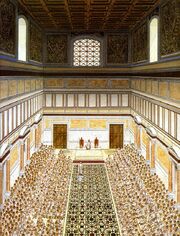
A picture of the Senate of Nouio
The Senate of Nouio was the chief legislative arm of the Keltoic government after the unification of Keltoia. Instead of a Senate that represented the whole nation, the Senate of Nouio was merely an evolution of the senate that had ruled Nouio when it was still a city state among the others of Keltoia. So, as a result, the Senate of Nouio was a pretty elitist institution, mostly bending to the will of Nouio, the richest city of the empire, with input from Locudula, Dubron, and Parisi, also influential cities. In addition, contrary from what one would expect from a senate, very few of its members were actually elected. A majority of the positions were either appointed by the Emperor or inherited from its previous holder. Of the 350 seats, 75 were elected by the people.
Unsurprisingly for a dictatorship, the Senate of Nouio didn't have that much power. By most Emperor's it was sidelined entirely, used for only ceremonial purposes. In fairness, some Emperor's leaned on it more than others, and sometimes it was an extremely important institution. However, even when it was at its most effective the Senate generally served as a reflection of the upper class, rarely if ever passing populist laws. Ultimately though, despite the influence it could have, most of its powers were at the discretion of Emperor.
Composition[]
As previously mentioned, there were 350 members of the Senate of Nouio, 75 of which were elected. That left 275 members serving appointed or hereditary positions. Of these, 30 were appointed by the Chiefs, five from each Chiefdom, each serving a lifetime term. The next 45 appointed positions were appointed by the Emperor himself, again, each one serving for life. The remaining 50 appointed positions were appointed by consensus from Locudula, Parisi, Dubron and Nouio, this time to serve 12 year terms, though in practice, they were reappointed until death. The other 150 none elected members were hereditary positions, the families being originally appointed in 13 AD, as soon as the Empire was formed. The Hereditary positions were passed down to the oldest child, meaning women could, and often did, inherit the position.
Meanwhile, of the 75 elected positions, 50 were elected by Nouio, Locudula, Parisi, and Dubron, with Nouio electing 20 and the rest voting for only 10. These members served eigth year terms, but could be reelected only thrice. The next 12 elected members came from the other Chiefdoms, each one electing two for eight year terms, again renewable twice. The remaining 13 were elected in by Keltoia, this time for ten year terms, once again, renewable thrice. As one might imagine, this composition heavily weighed the balance of the senate in the favor of the Hereditary members, and even the elected members heavily favored the four biggest cities. This made the Senate a mostly unrepresentative group, though in fairness they were more representative than the Chiefs of Emperor.
Powers and Influence[]
The Senate of Nouio had two main powers under most Emperors: The first was to set and collect taxes (with the Emperor approving the levels they were set at) and the other was to suggest laws for the Emperors to approve, or approve laws set forth by the Emperor. The first duty was relatively simple - because tax levels rarely changed, most of the time, the Senate simply agreed to keep last years tax rate. Once the Emperor approved, perhaps 30 members would be assigned to make sure the taxes were collected effectively. Once in the hands of those 30 member,s the duties would then be delegated to local authorities, except in the case of Nouio itself, were the taxes were under the direct control of the Senate. Once the taxes were collected, the Senate was tasked with effectively storing them until the Emperor request use of them.
The other power, that being suggesting laws, tended to be a lot more complicated. While they could technically reject laws put forth by the Emperor, in practice, this was almost never done. On the few occasions it was done, backlash from the Emperor was inevitable. On most occasions, the law was passed anyway, and on one occasion, dozens of members of the Senate were purged. Because of this, the Senate rejecting the Emperor's will was obviously very rare. So, instead, the Senate was largely sidelined, except for proposing laws. And while the Emperor could always unilaterally reject them, proposing laws was their main way to assert their influence, even if they were often rejected, and always subject to the whims of the Emperor.
Obligations[]
Outside of the power of collecting taxes and proposing laws, the Senate has a set of obligations. While most of these revolved around keeping the city of Nouio sound, their most popular and important was organizing holidays. Because farming in Keltoia wasn't particularly labor intensive, citizens of Keltoia generally had two or three days of leisure a week, with more in the winter. Because of this, It often fell onto the Senate to organize activities or days off for the people. While the senate generally concentrated on Nouio, Dubron, Parisi, and Locudula, they would organize several days off for the entire nation. For the most part, this was what delivered the Senate political capital, and was one of the only things that they actually had control over without interference from the Emperor.
| |||||||||||||||||||||||||||||||

